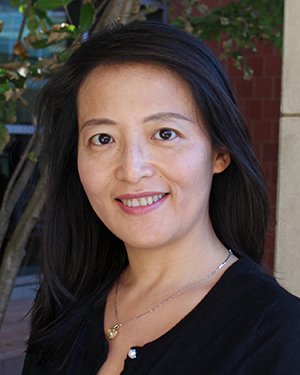New Brunswick, N.J., November 02, 2020 – Rutgers Cancer Institute of New Jersey researcher ‘Jessie’ Yanxiang Guo, PhD, has received a $1.7 million award from the National Institutes of Health (R01CA237347) to investigate the role of a cellular survival mechanism known as autophagy in the formation of tumors driven by mutations in tumor suppressors known as LKB1 and oncogene KRAS. The goal of this project is to validate the novel concept that blocking this cellular self-cannibalism process is a powerful therapeutic strategy against primary and metastatic LKB1-deficient KRAS-mutant non-small cell lung cancers (NSCLC).
According to the American Cancer Society, lung cancer is the leading cause of death in both men and women, with non-small cell lung cancer accounting for more than 85 percent of these cases. KRAS and LKB1 are two of the most frequent mutations detected in non-small cell lung cancer. Patients harboring co-mutations of KRAS and LKB1 develop aggressive lung tumors, show a high frequency of cancer spreading beyond the initial tumor site (metastasis) and are resistant to standard therapeutics.

Using pre-clinical mouse models, Guo previously found that autophagy is essential for slowing the formation and spread of tumors, a process known as tumorigenesis, from forming in LKB1-deficient KRAS-mutant lung cancer. In this new project, Guo and colleagues will explore the mechanism by which autophagy regulates lipid metabolism for LKB1-deficient KRAS-mutant tumorigenesis in laboratory mouse models and determine how autophagy promotes LKB1-deficient KRAS-mutant tumor metastasis. The successful completion of this project will give researchers a deeper understanding of how LKB1-deficient KRAS-mutant tumors utilize autophagy to meet their massive energy demands.
“New treatment is urgently needed for this subtype of non-small cell lung cancer,” notes Guo, who is also an assistant professor of medicine at Rutgers Robert Wood Johnson Medical School. “In this project we aim to discover pathways that are regulated by autophagy and could be used for the therapeutic targets in the treatment of LKB1-deficient KRAS-mutant NSCLC, which may provide a basis for future clinical trials.”
This project runs through January 2025.
About Rutgers Cancer Institute of New Jersey
As New Jersey’s only National Cancer Institute-designated Comprehensive Cancer Center, Rutgers Cancer Institute, together with RWJBarnabas Health, offers the most advanced cancer treatment options including bone marrow transplantation, proton therapy, CAR T-cell therapy and complex surgical procedures. Along with clinical trials and novel therapeutics such as precision medicine and immunotherapy – many of which are not widely available – patients have access to these cutting-edge therapies at Rutgers Cancer Institute of New Jersey in New Brunswick, Rutgers Cancer Institute of New Jersey at University Hospital in Newark, as well as through RWJBarnabas Health facilities. To make a tax-deductible gift to support Rutgers Cancer Institute of New Jersey, call 848-932-8013 or visit www.cinj.org/giving.
###
For journalists – contact:
Krista Didzbalis
Media Relations Assistant
908-812-6114
krista.didzbalis@rutgers.edu
For patient appointments/inquiries – contact:
844-CANCERNJ (844-226-2376)


